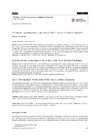Please use this identifier to cite or link to this item:
https://accedacris.ulpgc.es/jspui/handle/10553/77231
| Title: | Un roman « postmoderne » des années 1920: « Vasco » de Marc Chadourne | Other Titles: | Una novela « posmoderna » de los años 1920: "Vasco" de Marc Chadourne A “Postmodern” Novel of the 1920s: "Vasco" de Marc Chadourne |
Authors: | Gerard Lojacono, Florence Yolande | UNESCO Clasification: | 570107 Lengua y literatura 620202 Análisis literario |
Keywords: | Chadourne Vasco Aventura Ansiedad Posmodernismo, et al |
Issue Date: | 2020 | Journal: | Theleme-Revista Complutense De Estudios Franceses | Abstract: | Marc Chadourne (1995-1975), casi olvidado hoy, ha publicado una novela de gran éxito en 1927, Vasco. Con el pretexto de presentar un concentrado de los temas emblemáticos de la literatura de los años 1920, como la ansiedad, el exotismo y la santidad, Vasco es sobre todo una novela posmoderna antes de la hora. De hecho, las preguntas formuladas en esta ficción insular deconstruyen la posibilidad misma de aventura y resaltan la aporía del ¿por qué vivir? Desde el contexto de la publicación de Vasco y su recepción crítica, veremos por qué, incluso en el corazón de la isla paradisíaca, el protagonista no puede escapar de sus demonios. Marc Chadourne (1895-1975), à peu près oublié aujourd’hui, a publié un roman qui connut un énorme succès en 1927, Vasco. Sous couvert de présenter un concentré des thèmes emblématiques de la littérature des années 1920 tels que l’inquiétude, l’exotisme et la sainteté, Vasco est surtout un roman postmoderne avant l’heure. En effet, les questionnements mis en scène dans cette fiction insulaire déconstruisent la possibilité même de l’aventure et mettent en lumière l’aporie du « pourquoi vivre ? » En partant du contexte de publication de Vasco et de sa réception critique, nous verrons pourquoi, même au cœur de l’île paradisiaque, le protagoniste ne peut échapper à ses démons. Marc Chadourne (1895-1975), almost forgotten today, published a hugely successful novel in 1927, Vasco. Under the guise of a cluster of the emblematic themes of 1920s literature—such as anxiety, exoticism and holiness—Vasco is above all a postmodern novel ahead of its time. Indeed, the questions staged in this island fiction deconstruct the very possibility of adventure and highlight the aporia “why keep living?”. Starting from the context of Vasco’s publication and its critical reception, we will see why, even in the very heart of the paradise island, the protagonist fails to escape his demons. |
URI: | https://accedacris.ulpgc.es/handle/10553/77231 | ISSN: | 1139-9368 | DOI: | 10.5209/thel.70083 | Source: | Theleme [ISSN 1139-9368], v. 35 (2), p. 229-237, (Enero 2020) | URL: | http://dialnet.unirioja.es/servlet/articulo?codigo=7704154 |
| Appears in Collections: | Artículos |
Page view(s)
107
checked on Jul 27, 2024
Download(s)
88
checked on Jul 27, 2024
Google ScholarTM
Check
Altmetric
Share
Export metadata
Items in accedaCRIS are protected by copyright, with all rights reserved, unless otherwise indicated.
